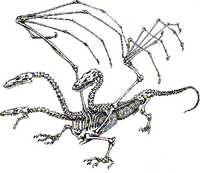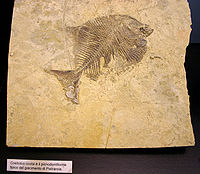Difference between revisions of "Applicability"
| Line 100: | Line 100: | ||
will always apply. !--> |
will always apply. !--> |
||
==Old concept== |
==Old concept== |
||
| − | The text by [[Michael Haselgrove]] above reveals, that [[ |
+ | The text by [[Michael Haselgrove]] above reveals, that [[Applicability]], as philosophic principle, is very old and is known during kiloyears. |
Perhaps, it is oldest postulate among the TORI axioms. For this reason, [[Applicability]] is declared as First axiom. |
Perhaps, it is oldest postulate among the TORI axioms. For this reason, [[Applicability]] is declared as First axiom. |
||
Declaration of the limited range of applicability applies to the Human knowledge, and only to scientific concepts. |
Declaration of the limited range of applicability applies to the Human knowledge, and only to scientific concepts. |
||
However, the God's knowledge may greatly exceed this, but detalied properties of the [[God]]'s knowledge fall out of topics of [[TORI]]; |
However, the God's knowledge may greatly exceed this, but detalied properties of the [[God]]'s knowledge fall out of topics of [[TORI]]; |
||
| − | and such questions refers to religious knowledge rather than to [[ |
+ | and such questions refers to religious knowledge rather than to [[science|scientific]] one. |
==References== |
==References== |
||
Revision as of 10:45, 8 August 2013
Applicability is First of the TORI axioms; it specifies the fist property of every scientific concept:
The concept has some limited range of validity, distinguishable from the empty set.
Limited range of validity
The need to declare the limits of validity of a scientific concept is not obvious. Several critics had been suggested to withdraw the requirement that the range of validity of the concept should be limited. Practically, this refers to extension of the range of validity of some concept to the Full Set.
Empirically it is known, that the consideration of elements of the Full Set leads to contradictions; for example, the ”Barber paradox”:
The barber in the military corpus is ordered to shave everybody, who does not shave himself: Should he shave himself?
Generalizing this paradox, the “barber” should be replaced to “set”, and “shave” should be replaced to “include as element”. In order to avoid such paradoxes, the limit of applicability is important. Especially dangerous is consideration of any concept, that includes itself into area of applicability. For this reasons, while possible, the TORI axioms, by themselves, are not treated as a scientific concept. In this sense, the TORI axioms can be considered as kind of Religion. Then, the barber, mentioned above, has no need even to think about shaving himself; he does not belong to the set of objects, where the operation of shaving is defined.
As any other religion, the TORI claim their especial efficiency in comparison to other religions, in considering of practical questions and considering the practical problems. This claim is supported, in particular, by the First axiom: not so many other religions (if at all) recognize the limits of applicability of their concepts.
The limiting of range of validity disqualified since the beginning any kind of United theory of everything. As in case of other axioms, there is no way to proof such a requirement; it appears just as empiric observation, that theories that pretend to describe "everything", practically describe close to nothing, and do not allow to make any meaningful, confirmable (and refutable) predictions.
Non empty set

Important limitation is related with the requirement that the area of applicability is not empty. This requirement is also not obvious.
Applicability requires the existence of at least one case, when the concept can be applied; id est, some non-trivial predictions can be done on the base of the concept.
For this criterion, the Dragonology is not qualified as science, although some scientific methods can be used in the analysis of the non–existing dragons, namely, big, three-headed, fire-emitting reptile–like dangerous creatures [2]. In the similar way, the Theory of spherical cows in vacuum [3] also is not qualified as scientific.

The important question is about paleontology. it deals with species, that, perhaps, existed several megayears ago. The solution is declaration, that paleontology describes the observation, fossiles; then, the hypothesis, that some specific species existed in past, are just concepts, that describe the contemporary observations. The same applies to history, that appears as efficient description of existing documents.
Applicability in the Bible
Text copypasted in this section had been suggested by Michael Haselgrove [5].
Limited applicability exists with the Bible in the following ways:
The things concealed belong to Jehovah our God, but the things revealed belong to us and to our sons to time indefinite, that we may carry out all the words of this law. - Deuteronomy 29:29 God has revealed many things to us through his Word, but not everything.
Everything he has made pretty in its time. Even time indefinite he has put in their heart, that mankind may never find out the work that the true God has made from the start to the finish. - Ecclesiastes 3:11 There are always going to be more things we don't know, not matter how much we learn.
But the path of the righteous ones is like the bright light that is getting lighter and lighter until the day is firmly established. - Proverbs 4:18 (See also John 16:12) God reveals his purposes progressively, not all at once, so as we understand more we may have to adjust what what we previously believed (because we did not see the whole picture).
The Bible contains rules which, though based on broad principles, were limited to a time and place. For example:
God is love. - 1 John 4:8. “You are worthy, Jehovah, even our God, to receive the glory and the honor and the power, because you created all things, and because of your will they existed and were created.” - Revelation 4:11 One of them, versed in the Law, asked, testing him: “Teacher, which is the greatest commandment in the Law?” He said to him: “‘You must love Jehovah your God with your whole heart and with your whole soul and with your whole mind.’ This is the greatest and first commandment. The second, like it, is this, ‘You must love your neighbor as yourself.’ On these two commandments the whole Law hangs, and the Prophets.” - Matthew 22:34-39 "We must obey God as ruler rather than men." - Acts 5:29.
This last one is an example of an absolute principle overriding a relative one, since Christians are commanded to obey the secular authorities at Romans 13. The context of Acts 5:29 is that human rulership was demanding that the preaching work God had commanded be stopped,
So they brought them and stood them in the San′he·drin hall. And the high priest questioned them and said: “We positively ordered YOU not to keep teaching upon the basis of this name, and yet, look! YOU have filled Jerusalem with YOUR teaching, and YOU are determined to bring the blood of this man upon us.” In answer Peter and the [other] apostles said: “We must obey God as ruler rather than men."
Old concept
The text by Michael Haselgrove above reveals, that Applicability, as philosophic principle, is very old and is known during kiloyears. Perhaps, it is oldest postulate among the TORI axioms. For this reason, Applicability is declared as First axiom.
Declaration of the limited range of applicability applies to the Human knowledge, and only to scientific concepts. However, the God's knowledge may greatly exceed this, but detalied properties of the God's knowledge fall out of topics of TORI; and such questions refers to religious knowledge rather than to scientific one.
References
- ↑ http://mmmf.msu.ru/lect/kvashenko.html Kvashenko. Драконы. (2013, in Russian)
- ↑ http://mizugadro.mydns.jp/o/index.php/Драконы by Квашенко Андрей Николаевич (2013, in Russian)
- ↑ http://en.wikipedia.org/wiki/Spherical_cow
- ↑ http://mizugadro.mydns.jp/t/index.php/File:9178_-_Milano_-_Museo_storia_naturale_-_Coelodus_costai_-_Foto_Giovanni_Dall%27Orto_22-Apr-2007.jpg
- ↑ Michael Haselgrove. Private communication. Thu, 8 Aug 2013 06:39:12 +0900. Thu, 8 Aug 2013 06:39:12 +0900